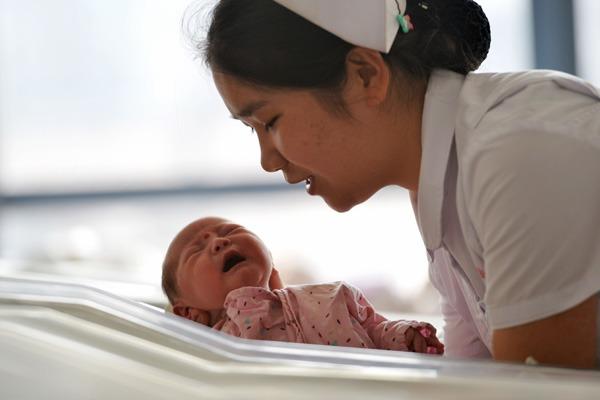 A nurse takes care of a newborn baby at Gansu Provincial Maternity and Childcare Hospital in Lanzhou. (PHOTO / XINHUA)
A nurse takes care of a newborn baby at Gansu Provincial Maternity and Childcare Hospital in Lanzhou. (PHOTO / XINHUA)
The survival rate of premature babies weighing between 1 and 1.5 kilograms at neonatal intensive care units in China has approached the level of developed countries, according a domestic study.
Survival rates among newborns delivered earlier than 32 weeks and those weighing less than 1.5 kg were 88 percent and 86 percent respectively, according to the clinical cohort study regarding extreme preterm infants, the first of its kind in China.
Survival rates among newborns delivered earlier than 32 weeks and those weighing less than 1.5 kg were 88 percent and 86 percent respectively
More than 10,800 newborns with such conditions from 57 large, tertiary hospitals spanning 25 provincial-level regions last year were included in the study, jointly conducted by the Chinese Neonatal Network, the Neonatal Specialist Alliance of National Child Medical Center and the Children's Hospital of Fudan University in Shanghai.
READ MORE: UNICEF envoy Ma Yili calls for brighter future for children
Nineteen percent of those babies actually weighed less than 1 kg. In addition, nearly half of the premature babies in the study were born after 30 to 31 weeks of pregnancy, and 17 percent of them were born before 28 weeks.
Medical experts said such clinical findings will function as baseline data to understand the country's current treatments for infants that are born premature-a condition that poses a major threat to those younger than 5 years old worldwide-and carry out follow-up clinical research and programs regarding improvement in the field.
"The study results showed a significant stride in China's treatment of preterm babies, especially over the past 10 to 15 years when neonatal medicine thrived and neonatal intensive care units were widely established," said Cao Yun, secretary-general of the Chinese Neonatal Network, a collaborative network dedicated to research related to neonatal medicine, and director of the neonatal intensive care unit at Children's Hospital of Fudan University.
ALSO READ: Aid agencies: More newborns dying in West, Central Africa
However, doctors who led the study said that the results do not present a national picture as medical levels at tertiary hospitals, mostly in provincial capitals or municipalities, do not represent the national average and many medical institutions in small cities and rural regions do not have neonatal intensive care units.
Experts also pointed out that more efforts can be made to further lower the mortality rate and reduce the incidence of serious diseases, including brain injury and those related to vision and respiratory and digestive systems, after premature babies survive.
"A comprehensive strategy needs to be unveiled for unified standards during each step of medical treatment, nursing and patient management when caring for the newborn during his or her stay in the hospital and follow-up checkups in early childhood," Cao said.


